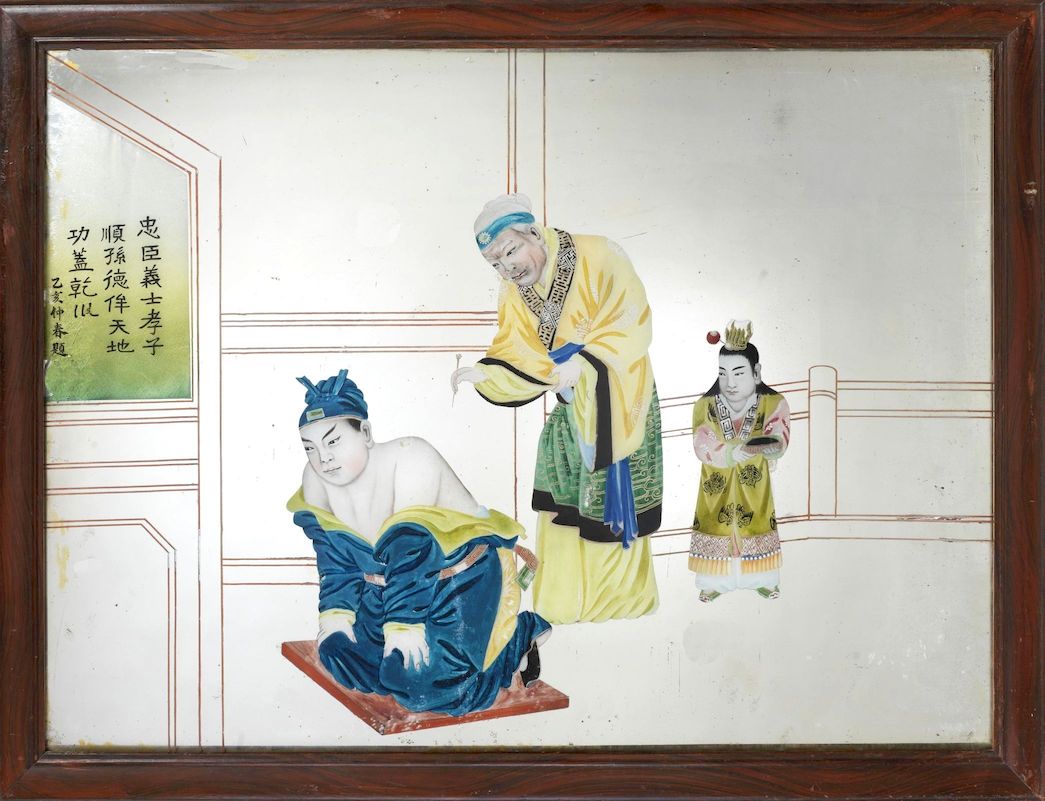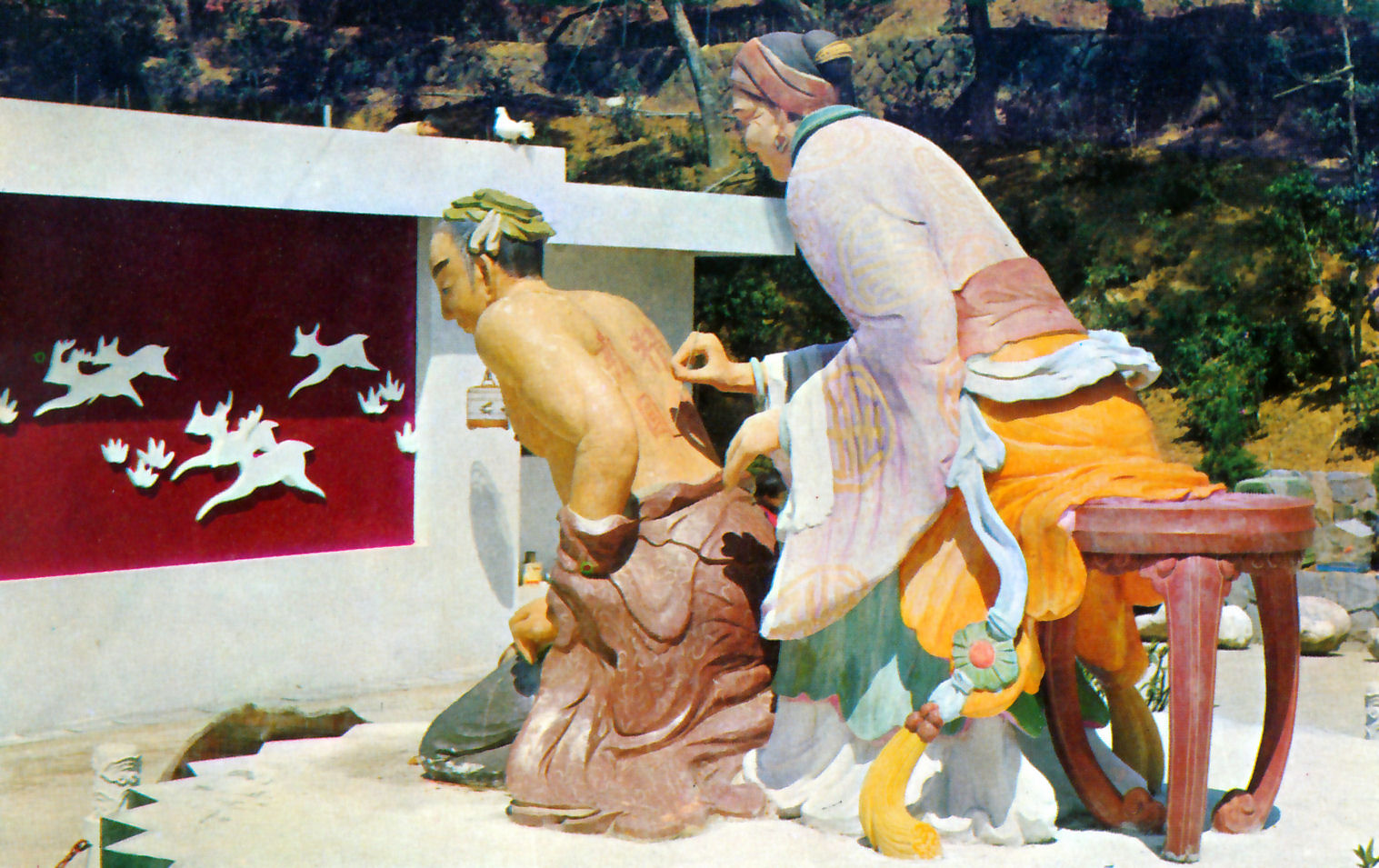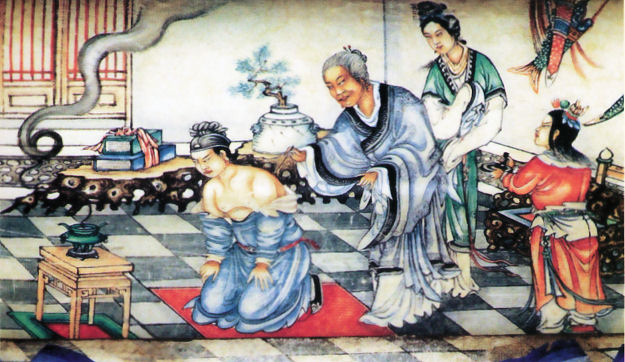
“She took a brush and ink, and on his back she wrote ‘Serve the country with total loyalty!’”
(Reverse Glass Painting from the Mei Lin Collection (Rupprecht Mayer and Haitang Mayer-Liem)"
YUÈ Fēi 岳飞 = a famous general (1103-1142)
Lady YÁO 姚 = his mother
CHÉN Tuán 陈抟 = a famed Daoist, probably long dead
WÁNG Míng 王明 = a benevolent (or opportunistic) country squire
YǏN Jìlún 尹继伦 = a famous archer
ZHŌU Tóng 州侗 = another one
QÍN Huì/Kuài 秦桧 = an oddly vicious pacifist
In the Northern Sòng 北宋 dynasty (period 15b), in the county of Tāngyīn 汤阴, on the banks of the Yellow River in the province of Hénán 河南, there lived a poor farmer named YUÈ Hé 岳和 and his wife who had come from the YÁO 姚 family.
It is said that one day his neighbors saw bright light coming from the tiny Yuè house and rushed to help put out the fire. But it was not a fire. What they found instead was that Yuè Hé’s wife had given birth to a son. Furthermore, a large roc (péngniǎo 鹏鸟) perched on the roof at exactly the same moment, which was also a very good omen.
In view of these omens, the new father named his son Fēi 飞, which means “flight,” and as a nickname he called him Péngjǔ 鹏举, which means “Roc Rises.”
About two months after Yuè Fēi was born, the Yellow River overflowed its banks and flooded the county of Tāngyīn. Yuè Fēi’s mother and father bundled him up and rushed from the house, but there was no place to go, for flood waters were rushing all around them and rising quickly. It was a desperate situation, but suddenly Yuè Fēi’s father was approached out of nowhere by a Daoist priest, who told him what to do and then abruptly vanished.
Following the strange priest’s instruction, his father put Yuè Fēi and his mother in an empty basin of the kind made to hold the household water supply after it was carried in from the river. As the flood waters rose, the basin, with Yuè Fēi and his mother inside it, rose and floated with his father in the water holding on to it.
The mysterious priest, of course, was an apparition of the great Daoist CHÉN Tuán 陈抟 (sometimes misread as Chén Bó 陈搏) because the unsimplified form of tuán 摶 looks too much like bó 搏). Chén Tuán had been dead for a century and a half but that is not something that bothers Daoists very much, and his spirit sometimes appeared to help worthy people in difficult times.
Unfortunately, the rush of water was too strong, and the Yuè Fēi’s father lost his grip on the basin as his wife and son floated rapidly away from him.
Little Yuè Fēi and his mother finally washed up in Dàmíngfǔ 大名府 in Héběi 河北 province, and were sheltered by a wealthy and generous man named WÁNG Míng 王明, who attached them temporarily to his household as servants. There they waited for the waters to recede and hoped for word of Yuè Hé. Much of the countryside in ruins, and there was no word of Yuè Hé ever again.
So they stayed in Dàmíngfǔ.
Time passed. Yuè Fēi grew into childhood, and wanted to learn to read. A destitute widow with a child and no land obviously had no money for school, or even for paper or brushes, so Lady Yáo taught little Fēi to read and write using a willow branch for a brush and writing in the sand. (Some people say that Wáng let Yuè Fēi study with the Wáng family’s own children.)

Sometimes Fēi would gather twigs in the hills in the daytime that he could burn to make light at night in order to continue practicing reading and writing until he became very good at writing both prose and verse. (Some of his poems are still read today.)
He loved reading the ancient classics, especially the Spring and Autumn Annals (Zuǒshì Chūnqiū 左氏春秋, described elsewhere on this web site), which had also been a great favorite with the great hero GUĀN Yǔ 关羽 over a thousand years earlier (and GUĀN Yǔ even became a god of war). And as he grew older, Yuè Fēi like the heroes of old began studying martial arts and studied manuals of military strategy.
At length he managed to apprentice himself to the famed ZHŌU Tóng 州侗, who was the greatest archer of the age. After only an impressively short period of study, Yuè Fēi proved himself Zhōu’s best student ever, and the master was so pleased that he taught him his most esoteric and secret techniques. Then he gave Yuè the treasured iron bow with which Zhōu himself had made his reputation. The great archer Zhōu Tóng died soon after, happy that he had found a worthy successor.
Yuè Fēi was heartbroken at his teacher’s death, and twice a month he made offerings on Zhōu’s grave and pledged anew never to forget him.
But Yuè Fēi had now become one of the greatest warriors in the land, and the land needed him, for the Sòng dynasty was having more and more difficulty defending its territory from invasion from the area that is today Liáoníng 辽宁 province.
Historical Background: In that region, the pastoralist Khitan (Qìdān 契丹) tribes had established their Liáo 辽 dynasty (period 16), which fought against China sometimes. Among their subjects were the people known to us today as Jürchens (Nǚzhēn or Rǔzhēn 女真). The Jürchens eventually successfully rebelled against the Liáo dynasty, overthrew it, and founded a dynasty of their own in its place, which they called Jīn 金, meaning “gold” (period 18)
This had nothing to do with China, it might seem, but once their Jīn dynasty was successfully founded, the Jürchens decided to invade the Chinese heartland, and they began sending troops southward against the Sòng forces. This happened during the lifetime of Yuè Fēi. Eventually the Jürchens succeeded in conquering most of northern China, forcing the Sòng court to move south. That is why historians speak of a “Northern Sòng dynasty” (period 15b) and a “Southern Sòng dynasty” (period 15c).
As the Jīn forces were moving southward into northern China, all able bodied men were called to duty to defend the Sòng homeland. And naturally Yuè Fēi was among them. But what would his ancient mother think about his marching off to war and leaving her to fend for herself? No son could contemplate such a thing with equanimity. And yet the Jīn invaders had to be driven back somehow.
It was a truly tearful separation when he left, and as he was about to set out for the front, his mother ordered him to remove his shirt.

He did so, and she took a brush and ink, and on his back, where others could read it but he could not, she wrote in huge characters the words that were destined to be famous ever afterward, “Serve the country with total loyalty!” (Jìnzhōng bào guó 尽忠报国). Then she took a needle and pushed the ink into his skin to make a permanent tattoo.
Thus commanded by his mother, Yuè Fēi went off to war and soon became one of the country’s greatest military figures. (Surely that was why he had been born in a blaze of light and with a roc perched on the roof.)
(Later the emperor praised him with the similar phrase “Serve the country with perfect loyalty!” [jīngzhōng bào guó 精忠报国jīng], and to this day some people believe that was also the original tattoo. “Total loyalty” and “perfect loyalty” come to the same thing, and few people would have looked under his shirt. As the years passed, even Yuè Fēi may have become uncertain of the wording, since no one can see his own back.)
Yuè Fēi was fervent in his opposition to the Jīn incursions, but some in the imperial court advocated making peace with them before still more lives were lost. One of these people was the powerful prime minister QÍN Huì/Kuài 秦桧, who had spent time in Jürchen hands, knew their strength, and was perhaps sympathetic to their cause.
Prime minister QÍN Huì had Yuè Fēi, and all other pro-war officials imprisoned or exiled as real or potential traitors, and in the 1141 Treaty of Shàoxīng (Shàoxīng Héyì 绍兴和约) Sòng emperor Gāuzōng 高宗 was made to surrender the Sòng dynasty’s claim to its northern lands to Jīn emperor Xīzōng 金熙宗.
Although Yuè Fēi was confined and tortured, he persistently refused to confess to being a traitor. When Qín Huì was challenged as to whether there were grounds to continue holding him, his famous response was “maybe there are” (mòxūyǒu 莫须有), a phrase that lives today to refer to unwarranted, trumped-up charges.
Fearing that his enemy might be released, Qín and his wife slipped an order to the judge concealed in an orange, and Yuè Fēi was executed before he could be released for want of evidence. Popular opinion was outraged.
Two decades later Emperor Gāuzōng was succeeded by Emperor Xiàozōng 宋孝宗, who issued an amnesty to all of the anti-Jīn political prisoners, including the deceased Yuè Fēi. He required that the treacherous Qín Huì and his wife kneel before Yuè Fēi’s tomb in abject apology. (Statues of them in this pose are are still abused by visitors to the tomb.) And the new emperor granted Yuè Fēi the poshumous title of “Military Reverence” (Wǔmù 武穆).
Yuè Fēi’s fame as a symbol of patriotic fervor grew and grew. In 1211 the Emperor Níngzōng 宁宗 granted him the noble title “King of È” 鄂王 (and gave Qín Huì the title miùchǒu 缪丑, “wrong and ugly”).
In 2023 the story of Yuè Fēi’s heroic struggle to resist foreigners and avoid the loss of national territory was the basis of an officially promoted and very popular film, “River All Red” (Mǎn Jiāng Hóng 满江红), a title borrowed from the name of a well-known poem attributed to Yuè Fēi and filled with admonitions to behead China’s foes and drink their blood in order to recover lost land (interpreted at the time of the film’s release, as referring to Taiwan).
